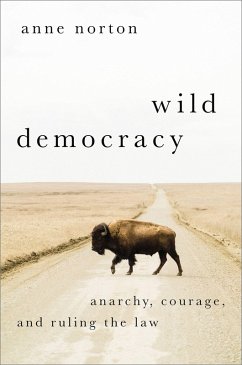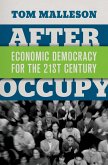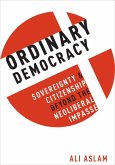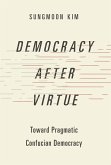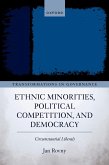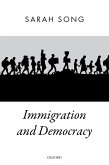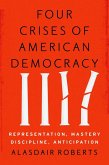

Alle Infos zum eBook verschenken

- Format: ePub
- Merkliste
- Auf die Merkliste
- Bewerten Bewerten
- Teilen
- Produkt teilen
- Produkterinnerung
- Produkterinnerung

Hier können Sie sich einloggen

Bitte loggen Sie sich zunächst in Ihr Kundenkonto ein oder registrieren Sie sich bei bücher.de, um das eBook-Abo tolino select nutzen zu können.
Wild Democracy calls for a more anarchic, more courageous democracy. This is an ethic for people who know the rights they hold, and who struggle to rule themselves. This is an ethic for unfinished revolutions; an ethic for those who will not be mastered. This is an ethic for those who hold fast to the rights they have by nature. This is an ethic that requires courage. Democracy is always a risky business; full of promise and danger. The promise is the freedom to rule ourselves. The danger is fear: fear of the unknown, fear of the unruly, fear of one another, fear of anarchy. Fear leads to…mehr
- Geräte: eReader
- mit Kopierschutz
- eBook Hilfe
- Größe: 1.12MB
![After Occupy (eBook, ePUB) After Occupy (eBook, ePUB)]() Tom MallesonAfter Occupy (eBook, ePUB)11,95 €
Tom MallesonAfter Occupy (eBook, ePUB)11,95 €![Ordinary Democracy (eBook, ePUB) Ordinary Democracy (eBook, ePUB)]() Ali AslamOrdinary Democracy (eBook, ePUB)43,95 €
Ali AslamOrdinary Democracy (eBook, ePUB)43,95 €![Democracy after Virtue (eBook, ePUB) Democracy after Virtue (eBook, ePUB)]() Sungmoon KimDemocracy after Virtue (eBook, ePUB)18,95 €
Sungmoon KimDemocracy after Virtue (eBook, ePUB)18,95 €![Ethnic Minorities, Political Competition, and Democracy (eBook, ePUB) Ethnic Minorities, Political Competition, and Democracy (eBook, ePUB)]() Jan RovnyEthnic Minorities, Political Competition, and Democracy (eBook, ePUB)70,95 €
Jan RovnyEthnic Minorities, Political Competition, and Democracy (eBook, ePUB)70,95 €![Unsurpassed (eBook, ePUB) Unsurpassed (eBook, ePUB)]() Helmut NorpothUnsurpassed (eBook, ePUB)32,95 €
Helmut NorpothUnsurpassed (eBook, ePUB)32,95 €![Immigration and Democracy (eBook, ePUB) Immigration and Democracy (eBook, ePUB)]() Sarah SongImmigration and Democracy (eBook, ePUB)13,95 €
Sarah SongImmigration and Democracy (eBook, ePUB)13,95 €![Four Crises of American Democracy (eBook, ePUB) Four Crises of American Democracy (eBook, ePUB)]() Alasdair RobertsFour Crises of American Democracy (eBook, ePUB)13,95 €
Alasdair RobertsFour Crises of American Democracy (eBook, ePUB)13,95 €-
-
-
Dieser Download kann aus rechtlichen Gründen nur mit Rechnungsadresse in A, B, BG, CY, CZ, D, DK, EW, E, FIN, F, GR, HR, H, IRL, I, LT, L, LR, M, NL, PL, P, R, S, SLO, SK ausgeliefert werden.
- Produktdetails
- Verlag: OUP eBook
- Erscheinungstermin: 28. Februar 2023
- Englisch
- ISBN-13: 9780197644362
- Artikelnr.: 67441168
- Verlag: OUP eBook
- Erscheinungstermin: 28. Februar 2023
- Englisch
- ISBN-13: 9780197644362
- Artikelnr.: 67441168
- Herstellerkennzeichnung Die Herstellerinformationen sind derzeit nicht verfügbar.
* Theses for democrats
* I. Anarchy, courage, democracy
* 1. Anarchy is the shadow and salvation of democracy. Authoritarianism
is the enemy.
* 2. For anarchy, we need the anarchic.
* 3. Democrats are shabby.
* 4. Fear is the enemy of the democrat.
* 5. If people are to rule themselves, they must have courage.
* 6. Democrats take risks.
* II. Free people keep something wild in them
* 1. Rebellion is not only a right: it is a duty.
* 2. The democratic citizen is both subject and sovereign.
* 3. Self rule is a discipline.
* 4. Empire is the enemy of the democratic.
* 5. Free people keep something wild in them.
* IV. The canon of Western political philosophy was forged against the
people.
* 1. The canon of Western political philosophy was forged against the
people.
* 2. Forget Athens. Forget democratic genealogies.
* V. Democracies are generative. Democracies are excessive. Democrats
live with open hands.
* 1. Democracies are places of wild diversity.
* 2. The democratic disposition is cosmopolitan.
* 3. How free people love their countries.
* 4. Democracies are generative. Democracies are excessive. Democrats
live with open hands.
* 5. All you need for democracy is humanity.
* VI. Taxes are how people pay for the work they do together.
* 1. Democratic politics is born from human fragility.
* 2. The strength of the poor is the strength of democracy.
* 3. Want and democratic drive.
* 4. Taxes are how the people pay for the work they do together.
* VII. Rights are born in the body.
* 1. Rights are grounded in the body.
* 2. People have the right to life, to liberty and to the pursuit of
happiness.
* 3. People have the right to speak and to be silent.
* 4. People have the right to assemble.
* 5. People have the right to a place in the world. People have the
right to move.
* 6. Rights are inalienable.
* 7. Rights are common.
* 8. Rights find their limits in the body.
* VIII. Free People rule the law.
* 1. Rights are above, below and beyond the law. Rights undergird the
law. Rights elevate the law.
* 2. Rule law. Do not simply be ruled by it.
* 3. People should judge.
* 4. The people are wise.
* 5. Democracies depend on truth.
* 6. Truth prospers when the people rule.
* IX. Liberalism is a problem for democracy.
* 1. Undemocratic governments are unjust but not all democracies are
just. Democracy is a necessary but not sufficient condition for
justice.
* 2. The problem with liberalism
* 3. In defense of populism.
* 4. Institutions alone cannot ensure that the people rule.
* 5. How free people might choose their leaders.
* 6. Decentralization protects the rule of the people.
* 7. People can always recall their representatives, servants and
officials.
* 8. Executive energy belongs to the many rather than the one.
* 9. The people, steering.
* X. Force is the enemy of the free.
* 1. Military power is a danger to democracy.
* 2. Free people go to war together or not at all.
* 3. Private weaponry is an offense to free people.
* 4. Punishment demeans the democratic.
* 5. Free people are not policed.
* XI. We have not yet finished with revolution.
* 1. Without free and courageous people, there are no democratic
governments.
* 2. We are not democrats yet. We do not yet rule ourselves.
* 3. Self rule is a discipline.
* 4. We have not yet finished with revolution.
* 5. Democracy is not an idyllic state, democracy is a struggle.
* 6. Democracy is fugitive.
* XII. The time of the democratic is past, present and future.
* 1. Democracy is episodic
* 2. The time of democracy is a time of celebration.
* 3. The time of democracy is a time of danger.
* 4. The time of democracy is a time of creation
* 5. Democratic time is sacred time.
* 6. The time of the democratic is past, present, and future.
* XIII. People who rule themselves look both forward and back.
* 1. Democrats are conservative, progressive and radical.
* 2. Democracy moves upward.
* 3. Democracy moves downward.
* 4. People who rule themselves look both forward and back.
* XIV. Free people carry the democratic with them.
* 1. Assembly preserves the anarchic. Assembly nurtures the democratic.
* 2. Democracy belongs to the city.
* 3. Democracy belongs to the country.
* 4. Free people carry the democratic with them. They should carry it
into the factory, the shop, the school.
* 5. Democracy cannot be fenced out of the economic realm or separated
from the social.
* 6. The rule of the people lives and is endangered in each person's
body.
* XV. The friends and enemies of the democratic and how to deal with
them.
* 1. Equality is proper to democracy.
* 2. Inequality corrupts democracy.
* 3. Friendship teaches people to live democratic lives.
* 4. The enemies of the democratic and how to deal with them.
* XVI. Let us walk like gods.
* 1. In ruling themselves, people become divine.
* 2. The voice of the people is the voice of God.
* 3. The people sing.
* 4. The earth belongs to the living.
* Appendix of Imperatives
* Acknowledgements
* Theses for democrats
* I. Anarchy, courage, democracy
* 1. Anarchy is the shadow and salvation of democracy. Authoritarianism
is the enemy.
* 2. For anarchy, we need the anarchic.
* 3. Democrats are shabby.
* 4. Fear is the enemy of the democrat.
* 5. If people are to rule themselves, they must have courage.
* 6. Democrats take risks.
* II. Free people keep something wild in them
* 1. Rebellion is not only a right: it is a duty.
* 2. The democratic citizen is both subject and sovereign.
* 3. Self rule is a discipline.
* 4. Empire is the enemy of the democratic.
* 5. Free people keep something wild in them.
* IV. The canon of Western political philosophy was forged against the
people.
* 1. The canon of Western political philosophy was forged against the
people.
* 2. Forget Athens. Forget democratic genealogies.
* V. Democracies are generative. Democracies are excessive. Democrats
live with open hands.
* 1. Democracies are places of wild diversity.
* 2. The democratic disposition is cosmopolitan.
* 3. How free people love their countries.
* 4. Democracies are generative. Democracies are excessive. Democrats
live with open hands.
* 5. All you need for democracy is humanity.
* VI. Taxes are how people pay for the work they do together.
* 1. Democratic politics is born from human fragility.
* 2. The strength of the poor is the strength of democracy.
* 3. Want and democratic drive.
* 4. Taxes are how the people pay for the work they do together.
* VII. Rights are born in the body.
* 1. Rights are grounded in the body.
* 2. People have the right to life, to liberty and to the pursuit of
happiness.
* 3. People have the right to speak and to be silent.
* 4. People have the right to assemble.
* 5. People have the right to a place in the world. People have the
right to move.
* 6. Rights are inalienable.
* 7. Rights are common.
* 8. Rights find their limits in the body.
* VIII. Free People rule the law.
* 1. Rights are above, below and beyond the law. Rights undergird the
law. Rights elevate the law.
* 2. Rule law. Do not simply be ruled by it.
* 3. People should judge.
* 4. The people are wise.
* 5. Democracies depend on truth.
* 6. Truth prospers when the people rule.
* IX. Liberalism is a problem for democracy.
* 1. Undemocratic governments are unjust but not all democracies are
just. Democracy is a necessary but not sufficient condition for
justice.
* 2. The problem with liberalism
* 3. In defense of populism.
* 4. Institutions alone cannot ensure that the people rule.
* 5. How free people might choose their leaders.
* 6. Decentralization protects the rule of the people.
* 7. People can always recall their representatives, servants and
officials.
* 8. Executive energy belongs to the many rather than the one.
* 9. The people, steering.
* X. Force is the enemy of the free.
* 1. Military power is a danger to democracy.
* 2. Free people go to war together or not at all.
* 3. Private weaponry is an offense to free people.
* 4. Punishment demeans the democratic.
* 5. Free people are not policed.
* XI. We have not yet finished with revolution.
* 1. Without free and courageous people, there are no democratic
governments.
* 2. We are not democrats yet. We do not yet rule ourselves.
* 3. Self rule is a discipline.
* 4. We have not yet finished with revolution.
* 5. Democracy is not an idyllic state, democracy is a struggle.
* 6. Democracy is fugitive.
* XII. The time of the democratic is past, present and future.
* 1. Democracy is episodic
* 2. The time of democracy is a time of celebration.
* 3. The time of democracy is a time of danger.
* 4. The time of democracy is a time of creation
* 5. Democratic time is sacred time.
* 6. The time of the democratic is past, present, and future.
* XIII. People who rule themselves look both forward and back.
* 1. Democrats are conservative, progressive and radical.
* 2. Democracy moves upward.
* 3. Democracy moves downward.
* 4. People who rule themselves look both forward and back.
* XIV. Free people carry the democratic with them.
* 1. Assembly preserves the anarchic. Assembly nurtures the democratic.
* 2. Democracy belongs to the city.
* 3. Democracy belongs to the country.
* 4. Free people carry the democratic with them. They should carry it
into the factory, the shop, the school.
* 5. Democracy cannot be fenced out of the economic realm or separated
from the social.
* 6. The rule of the people lives and is endangered in each person's
body.
* XV. The friends and enemies of the democratic and how to deal with
them.
* 1. Equality is proper to democracy.
* 2. Inequality corrupts democracy.
* 3. Friendship teaches people to live democratic lives.
* 4. The enemies of the democratic and how to deal with them.
* XVI. Let us walk like gods.
* 1. In ruling themselves, people become divine.
* 2. The voice of the people is the voice of God.
* 3. The people sing.
* 4. The earth belongs to the living.
* Appendix of Imperatives
* Acknowledgements
